Key Findings:
- Female students do well across the board in Core-STEM GCSEs, outperforming male students in most Core-STEM subjects
- Over 90% of female entrants receive A*-C grades in GCSE Biology, Chemistry, Physics
- Entrants for the Computing GCSE up 11.6% from 2022, but far less girls than boys pursued the GCSE subject.
GCSE Results 2023 – Overview
Girls did well across the board in GCSE Core-STEM subjects.
This year’s GCSE results are similar to those that were awarded to students before the pandemic in 2019, therefore academic attainment is most usefully compared to that dataset.
Overall, outcomes for all GCSE grades (7/A, 4/C, 1/G) are higher for entries from female students compared to male students.
Girls also continue to achieve better GCSE grades than boys in most Core-STEM subjects. We can celebrate news that over 90% of female entrants received A*-C grades in GCSE Biology, Chemistry, Physics.
Despite this encouraging statistic, the difference in academic attainment between boys and girls has narrowed, in comparison with 2019.
More GCSEs have been awarded today than ever before – GCSE entries in England, Northern Ireland and Wales are up 3.4% compared to 2022. The percentage of female students electing Core-STEM GCSEs is up by 7.2% compared to last year.
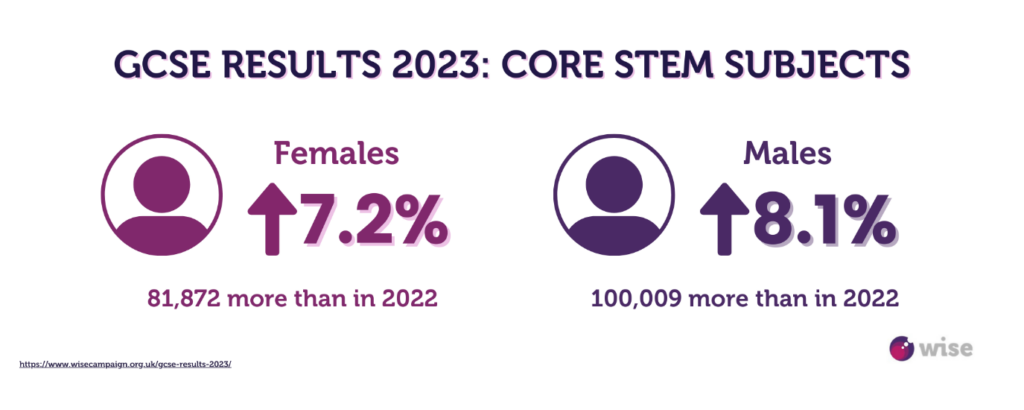
However, despite an increase in the total number of girls taking GCSEs this year, the proportion of them electing to pursue STEM subjects to GCSE remains relatively stable.
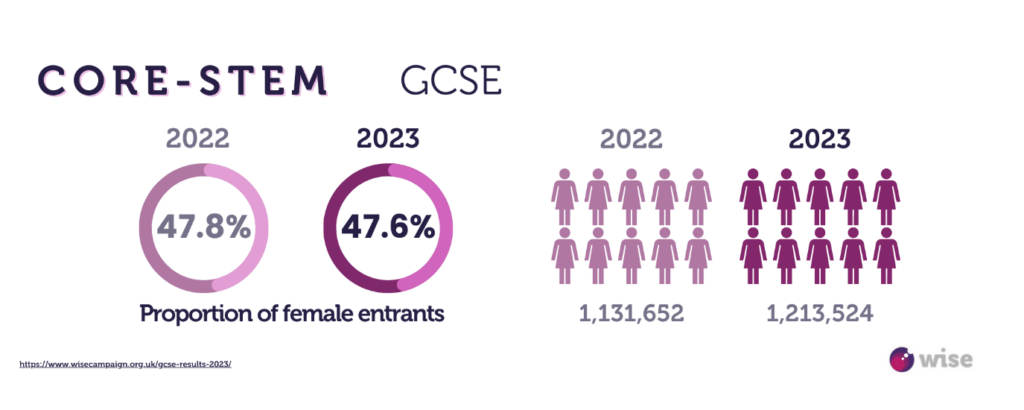
Chemistry GCSE
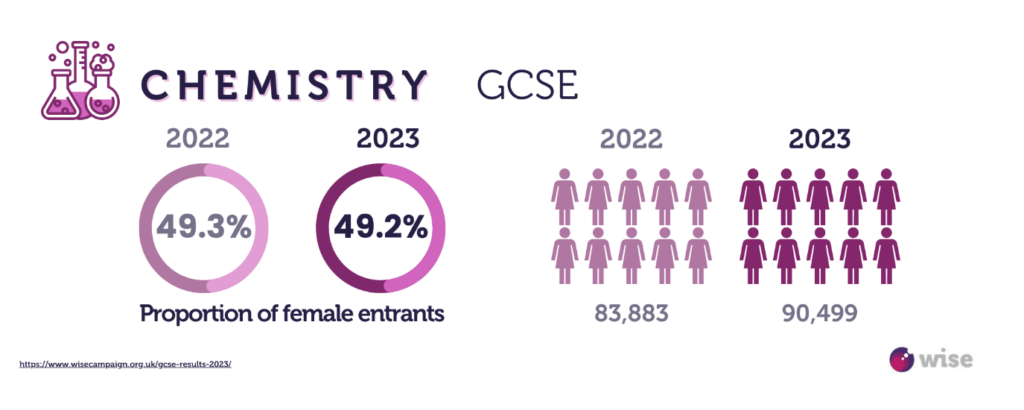
Girls continue to outperform boys in this subject area. 44.5% of girls were awarded A-A* results in Chemistry, although this represents a slight decrease compared to both 2022 (50.8%) and 2019 (45.3%) results.
Impressively, 89.6% of female entrants were awarded A*-C GCSE grades, an increase of 1.7% from 2019.
Physics GCSE
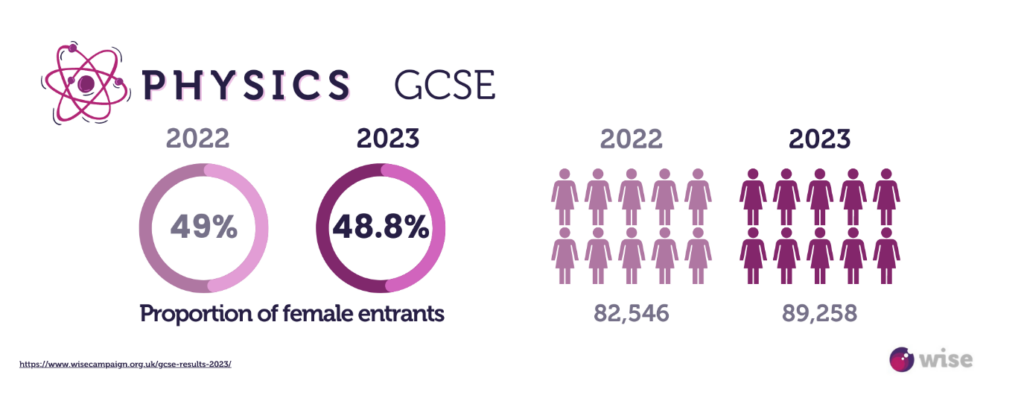
In Physics, an impressive 90% of female entrants were awarded A*-C grades, an increase of 1.9% from 2019.
40.6% of female entrants were awarded A-A*, compared to 46.1% of male entrants.
Biology GCSE
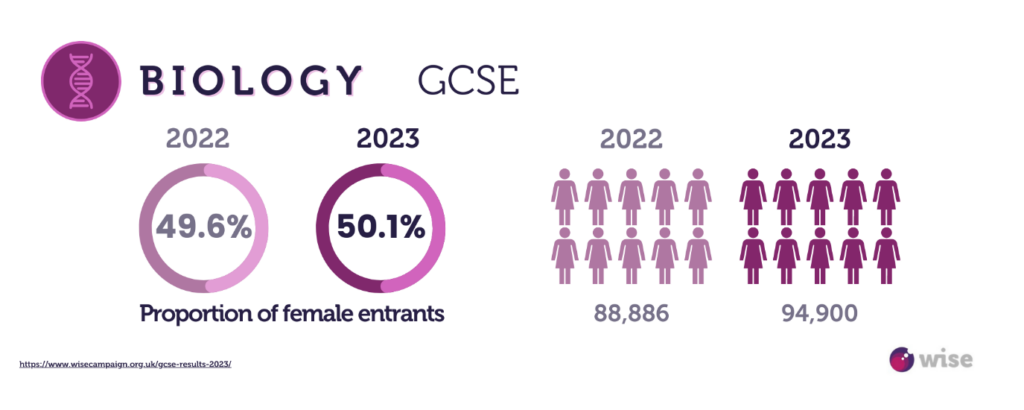
Girls continue to outperform boys in Biology.
This year, 90% of female entrants were awarded A*-C grades, an increase of 3% from 2019.
44.7% of female entrants were awarded A-A* in Biology, compared to 40.1% of male entrants. This represents a slight increase in A-A* attainment for girls, compared to the 2019 results.
Maths GCSE
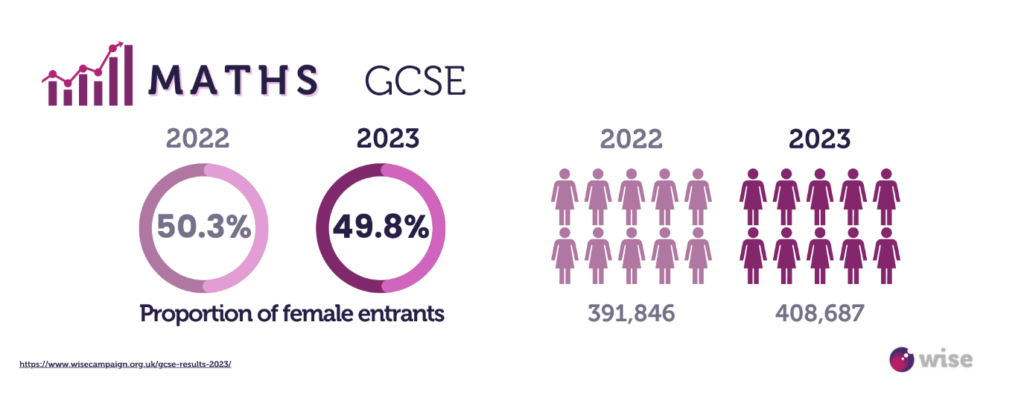
For Maths, 16.6% of female entrants were awarded A-A*, compared to 18.4% of male entrants.
60.4% of female students were awarded A-C grades, compared to 61.9% of male students.
Computing GCSE
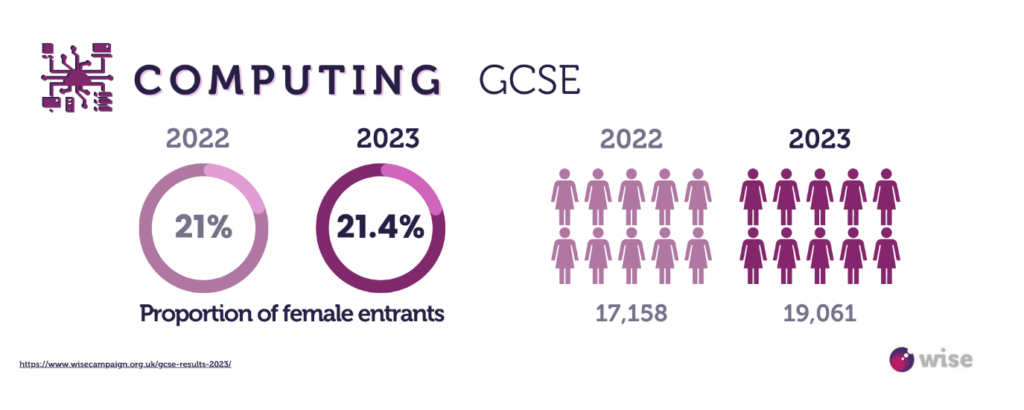
For subjects with under 100,000 entries, total entrants for the Computing GCSE were up 11.6% – from 81,120 in 2022 to 90,558 in 2023.
In 2023, only 19061 female students took Computing at GCSE, compared to 71497 male students. Given the increasing overall popularity of the GCSE Computing, we need to better understand what is preventing girls from pursuing it in greater numbers.
Despite the lower numbers of girls taking Computing at GCSE, girls outperform boys for academic attainment. Of the female students that did complete the Computing GCSE, 30% received A-A*, compared to only 23.1% of male students. 71.4% of female entrants received A-C, outperforming male students who received 63.1% respectively.
We can celebrate news that the proportion of girls being awarded top grades has increased. There has been a 5.1% yearly increase in female students awarded 7/A in GCSE Computing, and a 5.2% yearly increase in female students awarded 4/C.
Engineering GCSE
In Engineering, 76.6% of female entrants were awarded A-C grades, compared to 53.4% of male students – this represents an increase in attainment for female students of 6.5%, compared to 2019 results.
In 2023, 33.1% of female entrants were awarded A-A*, compared to 16.7% of male entrants. This represents a notable increase in academic attainment for girls compared to 2019. The proportion of girls attaining 7/A has increased by 9.7% since 2002, whilst the proportion awarded 4/C increased by 6.4% since 2022.
In addition, girls pursuing Engineering at GCSE level has increased by 33% from 2022.
Design and Technology GCSE
In Design and Technology, 31.2% of female entrants were awarded A-A*, compared to 16.7% of male entrants.
Despite this achievement, there was a 10.2% decrease in the total proportion of female students who took Design and Technology at GCSE level.
Science Double Award GCSE
9.9% of female entrants were awarded A-A* in the Science Double Award, compared to 7.9% of male entrants.
2023 saw a 10.9% increase in the proportion of female students awarded GCSE Science Double Award.
Other Sciences
For Other Sciences, 32.3% of female entrants were awarded A-A*, compared to 40.5% of male entrants.
Statistics GCSE
In 2023, the number of female students choosing to pursue Statistics at GCSE level increased by 10.6% from 2022. 54% of those girls were awarded A-A*.
Construction
124 female students completed a Construction GCSE in 2023. This represents a proportional increase of 125.5%, suggesting its increasing popularity among girls.
Compared to 2022, the proportion of girls attaining 7/A has increased by 19.71%, whilst the proportion awarded 4/C increased by 4.5%.
Mathematics Additional
An impressive 97.6% of female students were awarded A-C in 2023. 68.4% of female students were awarded A*-A, outperforming male students (60.4%).
The proportion of girls attaining 7/A has increased by 6.4% since 2022.

Increase in uptake “fuels the pipeline”
CEO of WISE Kay Hussain said: “A massive congratulations to all GCSE students today. It’s a testament to them that they have worked hard during a global pandemic and still done so well in their exams. I applaud their resilience and hard work.
“I’m delighted to see female students doing so well across the board in Core-STEM GCSE subjects, outperforming their counterparts.
“What really stood out for me was that over 90% of female entrants received A*-C grades in GCSE Biology, Chemistry, Physics, showing real promise for girls who may further their education and of course future careers in STEM.
“An increase in uptake helps to fuel the pipeline, which we know is desperately lacking, and ultimately will lead to the vital and necessary gender balance in STEM.
She added: “As encouraged as I am to see today’s results, and the narrowing of the gender gap in some STEM subjects, we have to look at the bigger picture and recognise that there is still much work to be done.
“As well as employers, we also work with educators and students to showcase the breadth of opportunities in STEM, thereby igniting an interest and inspiring them to reach their full potential in these highly rewarding, well-paid careers.
She added “I welcome all educators to get in touch to discuss how WISE could help. WISE has a tried and tested outreach platform to inspire girls aged 11-19 to consider a career in STEM.
“This is a great tool to use with boys too, as whilst it broadens their horizons in STEM, it helps to challenge the stereotypes and normalise that STEM careers are accessible for all.”
For more information on WISE offerings, visit here, or to explore the My Skills My Life tool here.
